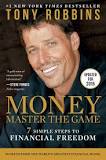 Tony Robbins’ updated “Money Master the Game“is a passionate call to get your finances in order. He says his approach is to relay the secrets of “what the most successful investors in history believe and practice.” He relies on an all-star cast of Warren Buffet, Ray Dalio, Paul Tudor Jones, David Swensen, and John Bogle. He lets you decide the best approach for you and your family, but with a heavy hand of what he thinks is best!
Tony Robbins’ updated “Money Master the Game“is a passionate call to get your finances in order. He says his approach is to relay the secrets of “what the most successful investors in history believe and practice.” He relies on an all-star cast of Warren Buffet, Ray Dalio, Paul Tudor Jones, David Swensen, and John Bogle. He lets you decide the best approach for you and your family, but with a heavy hand of what he thinks is best!
His writing style annoyed me with the constant baiting / teasing about upcoming “secrets” from the best investors ever. It drove me crazy as a reader. But that is the salesman and motivational speaker in him for sure! He knows how to set the hook and reel you in.
He summarizes the “secrets” into seven steps. I found the steps informative. They are not, however, specific enough for different audiences. The steps you take when you are in your 20s and 30s are different from those later in your career. The book provides little guidance to help you prioritize the recommendations.
The book is the strongest describing the actions you can take to become financially independent. Although he doesn’t say it, these tips appeal more to a younger crowd – those that are accumulating wealth. He describes three actions that are within your control.
1. Define and Clarify Your Goals
He is all about establishing life goals. Only then can you manage your finances to meet your goals.
Don’t just wander aimlessly through your financial life.
He wants you to put a price on your dreams (both big and small) and to figure out how much income it will take to have financial freedom.
Be real and don’t delude yourself.
2. Invest in Yourself
He encourages you to maximize your savings by starting early. He exhorts you to commit to save a percentage of your income automatically in your “Freedom Fund.” And importantly, to commit to increasing that percentage as you earn more and/or spend less.
He is absolutely right on to describe the awesome power of compounding. The idea of starting your savings early so that, over time, your funds will grow hugely. Although you must be patient to see the results.
He is at his best when he talks about how you can do set up your own Freedom Fund and commit to automatic savings to grow it.
He also urges you to become much more conscious of your spending habits. Are they advancing or harming your financial goals? Get rid of the expenses that don’t matter. He is great on why it makes sense to set up a spending plan and to establish clear time frames to pay off any debt.
He also describes a few financial tricks (really just math) to reach your goals sooner. Tips like paying off the mortgage quicker – pay the next month’s principal payment when you make your current monthly payment. And saving fees and/or taxes in order to invest the savings in your Freedom Fund.
3. Become Savvy about the Financial Industry
He devotes a substantial amount of time on how to protect yourself from the “lies” the financial industry tells you to separate you from your money.
He really beats the drum that investors should work with financial advisors that have a fiduciary duty. The financial advisor must not, however, have “dual-registration” with a brokerage firm that waters down their fiduciary duty.
He focuses on the research showing that mutual funds that “pick the best stocks” and “time the market” have not outperformed general indices of market performance. As a consequences, he extols the virtues of investing in low-cost passively managed index funds.
He urges you to check the fees your employer’s 401k or retirement plan charges. He explains the types of hidden fees in your 401k and how you can check them yourself. He explains how even seemingly small fees of 1.0% a year can really harm your investment performance over time.
These tips are more are good stuff and apply to most folks all the time. I found this chapter very readable.
In sum, he advocates an approach that is similar to mine. Define your goals before you can set out to achieve them. And be conscious of your spending and investment decisions.
The second half of the book explores the nuts and bolts of investing. I’ll tackle that topic next week.

No comments yet.